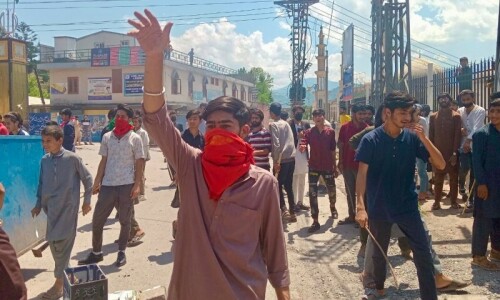The residents of the federal capital have been expressing frustration and anger at the administration and the Islamabad police for almost one year because of a surge in crime and lawlessness. Fingers have been pointed towards the recent arrivals in the city from other parts of the country, but the key suspects have usually been Afghan nationals.
This perception was strengthened after a fresh wave of Afghans arrived in Pakistan when the Taliban took power in Afghanistan, and the citizens of Islamabad witnessed a hike in rents of houses and commercial properties.
The recent decision by the Pakistan government to send back all ‘illegal’ Afghans has generally been taken positively by the residents of the federal capital, but some experts also warn that the assumptions behind this response may be misplaced.
“This impression [about Afghans being involved in rising crime] has been created by the police to deflect from their inefficiencies,” says Imtiaz Gul, Executive Director of the Centre for Research and Security Studies, an Islamabad-based think tank and an expert on Afghan issues.
The surge in crime is mainly due to the rapid increase in the population of the city in the past decade, says Gul, and people from all walks of life and belonging to all social classes shifting to the federal capital.
“This is like claiming all the terrorists in Pakistan were Afghans, but the [Tehreek-i-Taliban members] Mehsuds and Muslim Khan etc were all Pakistanis,” he points out. “The authorities even announced that the Youtuber Imran Riaz Khan had been kidnapped to Afghanistan, but he was recovered from Lahore.”
But the perception that Afghan refugees are behind a rise in crime in the capital has a lot of takers in the city, and it has been observed that petty crimes, phone-snatching and minor acts of vandalism are rampant around the areas where a large number of Afghans live.
“This area is a peaceful locality,” notes Waqar Abbasi, a senior journalist and resident of Margalla Town. “Many people did not even lock their houses. But after one person was shot dead over mobile snatching, we used all approaches and contacts to trace the culprits — they all belonged to the Afghan settlement and, as the police closed in, all of them ran away.
“The brother of one of the [suspect] boys was taken into custody and he provided all the information,” he adds. “Now there are no thefts or disturbances to routine life.”
Responding to the same query, a senior officer of the Islamabad police, who asked not to be named as he’s not authorised to talk on the matter, says that, within a week after launching the latest crackdown, the crime rate dropped sharply around the Sabzi Mandi area, in Tarnol, Sangjani, Barakahu etc.
The Islamabad police says that, during random checks in the city, 1,400 foreigners were cross- checked on the streets in different slums, residential and commercial areas of the capital and, of them, 525 failed to produce any legal travelling documents.
“All actions against the illegal settlers have currently been stopped, as they have time to leave the country, but the initial pressure was needed to give the message that the government was serious,” he says.
While the government decided on October 3 to expel all undocumented immigrants, the focus is mainly on Afghan nationals who have been told to leave Pakistan by October 31, or risk imprisonment and deportation.
It was also decided to take “strict action” against the businesses and properties owned by ‘illegal’ immigrants, while a taskforce has been constituted to scrutinise “fake identity cards illegally issued to foreign nationals as well as their businesses and properties.” However, it would be a daunting task for the ICT administration to trace the beneficial owners of commercial or residential properties, even if they have been bought on forged or fake CNICs.
Data vs claims
The perception about Afghan nationals being involved in illegal activities, including terrorism, particularly took root after the surge in the attacks on security forces in recent months.
Though no clear data is available to hold Afghan migrants mainly responsible for the rise in crime in the capital, many continue to cling to this perception.
“The older generation of Afghans were professional, but the younger generation — who are mostly at the helm of affairs now are undisciplined,” says Muhammad Amir, a veteran trader in the wholesale fruit and vegetable market of Islamabad. “They try to act like warlords using the labourers as foot soldiers, because they have money and settled businesses across Pakistan and Afghanistan. Their young boys even steal crates and sacks — we have reported it to the Sabzi Mandi police station several times.”
As the backlash against the Afghans continues, some housing societies have also issued a warning to their residents not to rent houses to Afghans. The Pakistan Telecommunication Authority (PTA), with the help of the Federal Investigation Agency (FIA), has also conducted several raids recently on mobile shop outlets and franchises operated by Afghan nationals, accusing them of selling mobile phone SIMs to Afghans. In addition, upon the request of the interior ministry, PTA has blocked international roaming in the areas bordering Afghanistan.
Incidentally, the previous Pakistan Democratic Movement coalition government too had a similar point of view. A week before the National Assembly was dissolved in August, the house was told that the surge in crime in Islamabad was primarily because of the arrival of new Afghan refugees.
Meanwhile, senior officials of the interior ministry claim the root cause is the attitude of the Afghan government. They say that, because of their leaders’ rhetoric, Afghan youngsters in Pakistan feel they are somehow being nationalist by damaging Pakistani society.
Concerns have also been raised about the potential lumping of all Afghans migrants as ‘illegal’, despite many having been registered as refugees by the government of Pakistan and many others in the process of having their status processed.
“The interior minister [Sarfaraz] Bugti sahib has said that there are around 1.7 million illegal Afghans in Pakistan,” says Sher Khan, an Islamabad-based contractor who has lived 40 years in Pakistan and whose brother is a trader in Sabzi Mandi in Islamabad. “Now, police will start witch-hunting against us all.”
The increasing antipathy towards Afghans, especially in Punjab, has also raised concerns within the Pakhtoon-dominated parties. Mahmud Khan Achakzai, the leader of the secular Pakhtunkhwa Milli Awami Party (PKMAP) and the Jamiat-i-Ulema-i-Islam leader Maulana Fazlur Rehman have both described the decision of government as one targeting Pakhtoons specifically.
“These Afghans are not a burden on this country — they are excellent traders, farmers and workmen, and even the young scavenger children help clean the cities,” says Achakzai. “The key issue in the country is the lack of the rule of law.”
“Such hatred results in wars and turmoil,” says Maulana Fazlur Rehman. “Can we bear such a situation?”
The writer is a member of staff
Published in Dawn, EOS, October 22nd, 2023














































Dear visitor, the comments section is undergoing an overhaul and will return soon.